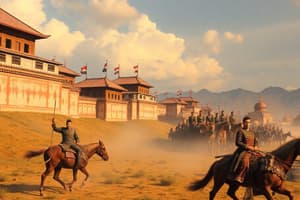Podcast
Questions and Answers
What was the extent of Genghis Khan's empire?
What was the extent of Genghis Khan's empire?
From the Pacific Ocean to the heart of Europe
How did Genghis Khan deal with enemies who surrendered?
How did Genghis Khan deal with enemies who surrendered?
He preferred enemies to surrender and pay tribute.
What were some of the cruel tactics used by Genghis Khan's army?
What were some of the cruel tactics used by Genghis Khan's army?
Using prisoners as human shields, burying captives alive, taking all women from conquered cities
How did Genghis Khan's legacy impact the population of Eurasia?
How did Genghis Khan's legacy impact the population of Eurasia?
What were some positive contributions of the Mongol Empire under Genghis Khan's rule?
What were some positive contributions of the Mongol Empire under Genghis Khan's rule?
Study Notes
- Genghis Khan was a formidable and feared leader in history, known for his unstoppable conquests across Eurasia in the 13th century.
- Despite the brutal campaigns of Genghis Khan that resulted in the death of millions, he was also a unifier who laid the groundwork for the modern world by establishing a vast empire stretching from the Pacific Ocean to the heart of Europe.
- Genghis Khan, originally born as Temujin, faced challenges in unifying warring Mongolian tribes but succeeded in creating one of the greatest empires known to the world.
- While Genghis Khan preferred enemies to surrender and pay tribute, his army's cruelty extended to using prisoners as human shields, burying captives alive in siege trenches, and taking all women from conquered cities.
- The legacy of Genghis Khan includes the catastrophic loss of over 40 million lives across Eurasia during his successors' invasions, accounting for approximately 10% of the world's population at that time.
- The Mongol Empire under Genghis Khan practiced religious tolerance, treated soldiers based on merit rather than lineage, established an extensive postal system, implemented legal governance, and contributed to civilization by preserving knowledge and spreading it across the empire.
- Despite the destruction caused by Genghis Khan's armies, the stability of Mongol rule revitalized the Silk Road, facilitating trade and cultural exchange between East and West, ultimately bringing an end to warring emirates in Russia and China to unify the countries.
Studying That Suits You
Use AI to generate personalized quizzes and flashcards to suit your learning preferences.
Description
Explore the life and legacy of Genghis Khan, the formidable Mongol leader who established one of the greatest empires in history through conquest and unification. Learn about his military strategies, governance policies, and impact on Eurasian civilizations.



